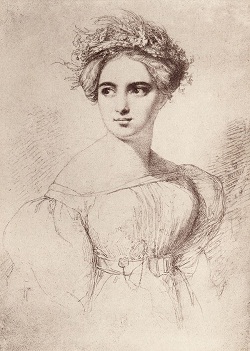How are you?
This week's lecture is “Felix
Mendelssohn”, the 11th topic of “Classical
Music”, which is a summary of the contents of “96. Classical Music: 11. Felix Mendelssohn”
introduced on July 15th, 2017.
Felix Mendelssohn, born
on February 3, 1809 and died on November 4, 1847, was a German composer,
pianist, organist and conductor of the early Romantic period.
 |
| Portrait of Mendelssohn, Eduard Magnus (1846) |
A grandson of the
philosopher Moses Mendelssohn and a son of the banker Abraham Mendelssohn, he
was born into a prominent Jewish family in Hamburg. A year after his birth, in
the same house, Ferdinand David, the dedicatee and first performer of his
Violin Concerto, was born.
 |
| Moses Mendelssohn |
 |
| Ferdinand David |
Mendelssohn began
taking piano lessons from his mother at the age of six, and received a musical
education from Marie Bigot in Paris at the age of seven.
 |
| Marie Bigot |
Raised without religion until the age of seven, when baptised as a Reformed Christian, Felix was recognized as a musical prodigy from an early age, but his parents refused to use his talent commercially.
His older sister Fanny, who had a similar musical
education, was also a talented composer and pianist, and some of her early
works were published under the name of her younger brother, Felix.
 |
| Fanny Mendelssohn, Wilhelm Hensel (1829) |
Mendelssohn enjoyed early success in Germany, and revived interest in Bach's music, especially when he performed Johann Sebastian Bach's “St Matthew Passion” in 1829.
 |
| Johann Sebastian Bach, Elias Gottlob Haussmann |
He performed throughout Europe as a composer, conductor and soloist, where he was well-received and his ten visits to Britain, where many of his major works were premiered, were an important part of his career.
Mendelssohn, who had an essentially conservative musical taste, was distinguished from more adventurous musical contemporaries, such as Franz Liszt, Richard Wagner, Charles-Valentin Alkan and Hector Berlioz. The Leipzig Conservatory, which he founded, served as a focal point for this anti-radical musical perspective.
 |
| The University of Music and Theatre Felix Mendelssohn Bartholdy, Leipzig |
Mendelssohn, who was in poor health in his later years, deteriorated further due to nervousness and overwork. Also, his last concert tour of England made him more exhausted and ill, and the death of his older sister, Fanny, on 14 May 1847 made him even more distressed.
 |
| Mendelssohn plays to Goethe, 1830, Moritz Oppenheim (1864) |
As a result, on November 4, less than six months after his sister
Fanny died, Mendelssohn died of strokes in Leipzig at the age of 38, and his
grandfather, parents and Fanny all died of similar strokes. Felix's funeral was
held at the Paulinerkirche in Leipzig, and his body was buried at the
Dreifaltigkeitsfriedhof in Berlin-Kreuzberg.
 |
| Mendelssohn's gravestone, Dreifaltigkeitsfriedhof |
Mendelssohn left behind
various genres of music, including symphonies, concertos, piano music, organ
music and chamber music. His most famous works include “A Midsummer Night's
Dream”, “Italian Symphony”, “Scottish Symphony”, oratorio “St. Paul”, oratorio “Elijah”, “The Hebrides Overture”, “Violin Concerto” and “String
Octet.” The melody for the Christmas carol "Hark! The Herald Angels
Sing" was also composed by Mendelssohn and his "Songs Without
Words" are his most famous solo piano compositions.
 |
| The composer's study in Mendelssohn House, a museum in Leipzig |
Long and relatively
denigrated due to changing musical tastes and antisemitism in the late 19th and
early 20th centuries, Mendelssohn's music has since been re-evaluated, and he
is now among the most popular composers of the Romantic era.
 |
| The Mendelssohn monument near Leipzig's St. Thomas Church |
Thank you.









